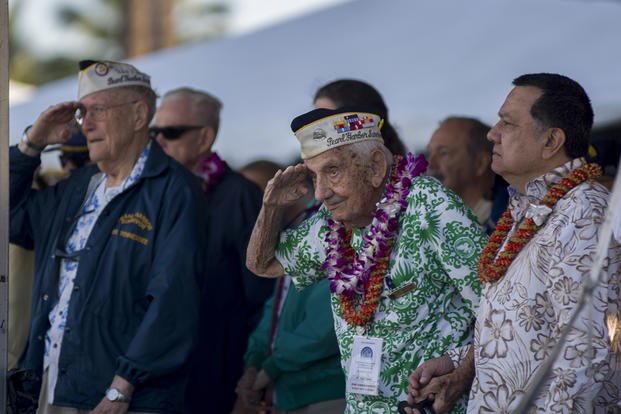It feels like a time of fear. It feels like we are always on the edge of more war -- more conflict, more battles, more farewells, more hurt, more pain, more disease more ... more.
Everyday we are confronted with questions of how world events -- terrorist attacks, natural disasters and sickness -- will affect our military, our families and our lives.
More than 80 years ago citizens across the country were united as they gathered around radios in their family rooms, listening to President Franklin D. Roosevelt's Fireside Chat 16: "The Arsenal of Democracy." The nation hung on his every word as the president detailed the threat of war and his faith that the country would pull through; it was a unifying speech aimed at clarifying their commitment to national security.
How many have actually watched a recent president give an address asking Americans to not live in fear? How have we managed to transition from a society that hungered for information on the state of our country in a time of civil unrest around the world, to this, a population more supportive of celebrities than soldiers?
On paper, the wartime sentiments then and now don't look all that different, and the parallels between the Syrian refugee crisis and the Jews fleeing Germany have already been drawn.
I recently came across my grandfather's letters to my grandmother while he was stationed in the South Pacific during World War 2. In a letter dated February 25, 1945, he writes:
"I just wonder at times if this war will ever get over. It's been going on so long now that it doesn't seem possible that there could be many men left to fight. I only hope when it's over we don't have to stay over here for six or eight months as occupational troops."
Almost 80 years years later, and those words very well could have been written by one of our spouses currently deployed. With so many similarities, what lessons from the Greatest Generation can we apply today?
4 Lessons from the Greatest Generation in a Time of Fear
1. Be informed. Helen Ann Langmade, a proud Army wife (now widowed), remembers Roosevelt's fireside chats as if they were yesterday. Her then-boyfriend, Charlie (they'd marry after his return from the Second World War), had just deployed and she was home in Newport Beach, California. "Everyone listened," she recalls. "The president was on the radio. You can't imagine how fast everyone rallied around. We were tuned in all day long."
No matter how you feel about our current leaders, we have a responsibility to understand our foreign policy; we are justified in wanting to know what kind of situation we're sending our spouses into. We have a right to question what it is we, as military families, are signing up for, over and over again, to fight for and defend.
2. Be engaged. Regardless of where you stand politically, our troops need our unwavering support. Helen Ann remembers the community standing behind the war efforts. "We had a victory garden in my parents' backyard, and everyone had their ration cards. Gas was rationed. Meat was scarce, sugar was rationed. You could only buy so much sugar per quarter." While our days of planting victory gardens may be gone, there are so many ways to get involved on the homefront. From volunteering at a VA hospital (check with your local VA hospital for details) to donating to a USO, showing support of our military partners is felt far beyond what we are able to touch.
3. Be vigilant. By now, you've hopefully seen the warnings to scrub your social media accounts. With ongoing threats to military members and their families, it's imperative that we maintain situational awareness. Helen Ann recalls the precautions they were mandated to take because her family's home faced the Pacific Ocean. "We had air wardens looking at the house every night. If they could see any light coming from beneath the blackout shades, we'd get a knock on the door. The lampposts were painted black. There was darkness as far as you could see. I get chills up my spine just thinking about how dark it was."
It feels like dark times now, too. Ensuring your personal safety and that of your service member is paramount. Be aware of your surroundings and pay attention to the news.
4. Have hope. Without promise for a better future because of the battles we fight today, we are lost. Helen Ann assures me that it's normal to worry, but that we have to keep the homefires burning. "Everyone was affected. Everyone knew someone fighting. But everyone was hopeful, too. We knew we were fighting for a better world."
In President Roosevelt's "Arsenal of Democracy" chat, he echoed her sentiments. "We have no excuse for defeatism. We have every good reason for hope -- hope for peace, yes, and hope for the defense of our civilization and for the building of a better civilization in the future."
And so we remain. Hopeful for these wars to end, hopeful that our families are protected, and hopeful that one day, our generation, too, will be regarded as great as Helen Ann and hers.
It has to start with us.
Keep Up with the Ins and Outs of Military Life
For the latest military news and tips on military family benefits and more, subscribe to Military.com and have the information you need delivered directly to your inbox.









